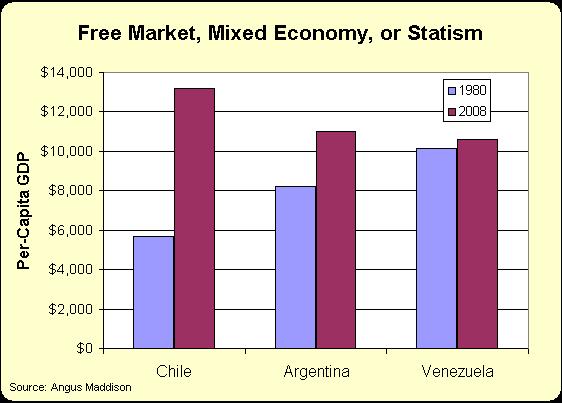

Venezuelan President Nicolás Maduro took over after leftwing dictator and former President Hugo Chavez died. (Photo: EPA)
Venezuela is falling apart. Decades of bad policy have produced economic stagnation and misery. On the other side of South America, Chile has enjoyed comparatively strong growth since reforms began in the 1980s.
Can we learn lessons by comparing these two nations?
Yes. More than five years ago, I compared three decades of data to show that pro-market Chile grew somewhat faster than mixed-economy Argentina and much faster than statist Venezuela (chart below).

Now we have some new data.
My colleague at the Cato Institute, Marian Tupy, has an article in Reason that compares Chile and Venezuela.
He starts by noting that the two nations have moved in dramatically different directions when measuring economic freedom.
Chile’s success starts in the mid-1970s, when Chile’s military government abandoned socialism and started to implement economic reforms. In 2013, Chile was the world’s 10th freest economy. Venezuela, in the meantime, declined from being the world’s 10th freest economy in 1975 to being the world’s least free economy in 2013.
Here’s a sobering chart on the changes.
Some may believe that economic freedom as merely an abstraction.
What’s more important, they argue, is results. Is a nation enjoying good economic performance, or is it stagnating?
Well, it turns out that the abstraction of economic freedom is very important if you want good performance. Here’s another chart from Marian’s article. You can see that Venezuela has stagnated while Chile has boomed.
Chile is not a perfect role model, to be sure, because of an unsavory period of military rule.
But the good news, Marian points out, is that economic liberty has led to political liberty. Whereas the opposite has happened in Venezuela.
…as the people of Chile grew richer, they started demanding more say in the running of their country. Starting in the late 1980s, the military gradually and peacefully handed power over to democratically-elected representatives. In Venezuela, the opposite has happened. As failure of socialism became more apparent, the government had to resort to ever more repressive measures in order to keep itself in power.
Here’s a chart showing the remarkable progress in Chile..as well as the deterioration of rights in Venezuela (please note that “1” means strong political rights and “7” means low or nonexistent political rights).
All this data seemingly is slam-dunk evidence for the Chilean model over the Venezuelan model.
Yet there have been a number of leftists who actually praised the statist policies of Venezuela’s authoritarian rulers. Here are some excerpts from an exposê in theDaily Caller.
Socialist Venezuelan dictator Hugo Chavez was praised throughout his life by many figures in academia, journalism and Hollywood despite his brutal regime. This praise included Salon writer David Sirota’s piece after the leader’s death, titled “Hugo Chavez’s economic miracle.” In British publication The New Statesman, a headline as Chavez was nearing death in January 2013 was “Hugo Chavez: Man against the world,” and its sub-headline read “As illness ends Hugo Chavez’s rule in Venezuela, what will his legacy be? Richard Gott argues he brought hope to a continent.” This praise of Chavez by so many who enjoyed the benefits of living in a capitalist society while looking at the economic record of the late leader, as well as what his successor President Nicolas Maduro, has come undone.
And Joe Stiglitz gushed about Venezuela’s economic performance back in 2007.
Nobel Prize winning economist and former vice-president of the World Bank, Joseph Stiglitz, praised Venezuela’s economic growth and “positive policies in health and education” during a visit to Caracas on Wednesday. “Venezuela’s economic growth has been very impressive in the last few years,” Stiglitz said during his speech at a forum on Strategies for Emerging Markets sponsored by the Bank of Venezuela. …Venezuela has taken advantage of the boom in world oil prices to implement policies that benefit its citizens and promote economic development. “Venezuelan President Hugo Chavez appears to have had success in bringing health and education to the people in the poor neighborhoods of Caracas, to those who previously saw few benefits of the countries oil wealth,” he said. In his latest book “Making Globalization Work,” Stiglitz argues that left governments such as in Venezuela, “have frequently been castigated and called ‘populist’ because they promote the distribution of benefits of education and health to the poor.” “It is not only important to have sustainable growth,” Stiglitz continued during his speech, “but to ensure the best distribution of economic growth, for the benefit of all citizens.”
Wow, this is a remarkable case of ideological blindness. Stiglitz presumably allowed his statist views to drive his analysis.
But let’s focus on one part of that excerpt. Yes, it’s very desirable for all citizens to benefit from economic growth.
But if you look at the chart from Marian’s article comparing GDP per capita in Chile and Venezuela, it’s abundantly clear which nation is producing better outcomes from average citizens.
This is a fundamental flaw of statists. By fixating on redistribution and equality, this leads them to policies that re-slice a shrinking economic pie.
The evidence from all over the world is that this is not a recipe for convergence with rich nations.
[mybooktable book=”global-tax-revolution-the-rise-of-tax-competition-and-the-battle-to-defend-it” display=”summary” buybutton_shadowbox=”true”]









